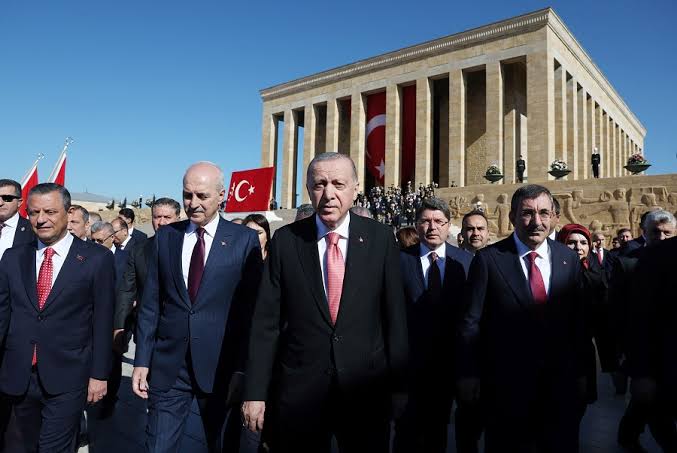Facebook Twitter (X) Instagram Somali Magazine - People's Magazine
The growing involvement of Turkey in the Horn of Africa has once again made headlines with President Recep Tayyip Erdogan’s upcoming visit to the region. The visit comes amid escalating tensions between Somalia and Ethiopia, with Ankara’s recent mediation efforts drawing both praise and criticism. Erdogan’s trip is expected to focus on strengthening Turkey’s economic and strategic ties in the region while addressing the contentious maritime access issue that has long fueled disputes between Somalia and its landlocked neighbor, Ethiopia.
The Horn of Africa, a region historically plagued by conflict and territorial disputes, has become a geopolitical hotspot where global and regional powers are vying for influence. Ethiopia’s persistent ambition to secure access to the sea has led to tensions with Somalia, with the latter resisting what it perceives as an encroachment on its sovereignty. Despite Somalia’s fragile state, its territorial integrity remains protected under international law, and its citizens are wary of any deals that might compromise their national interests.
Turkey has traditionally enjoyed strong relations with Somalia, providing economic assistance and infrastructure development while also managing key facilities such as Mogadishu’s port and airport. However, Ankara’s recent mediation between Somalia and Ethiopia has sparked skepticism among Somalis, who fear that Turkey may be prioritizing its strategic interests over Somalia’s sovereignty. Many are questioning whether Turkey’s facilitation of Ethiopia’s pursuit of sea access represents a betrayal of trust.
Ethiopia’s long-standing desire for maritime access has led it to push for deals that would grant it rights over strategic ports like Zeila, a move widely opposed by Somalis. Turkey’s role in mediating discussions has raised concerns, with some seeing it as an attempt to appease Ethiopia’s demands while sidelining Somalia’s objections. Critics argue that Turkey’s economic interests, particularly its multi-billion-dollar investments in Ethiopia and its military cooperation in the region, may be influencing its diplomatic approach.
Somalia remains cautious about any agreements that could grant Ethiopia military access to its ports, fearing that such moves could lead to an erosion of its sovereignty. While the Ankara Declaration reaffirmed Somalia’s territorial integrity, its wording regarding Ethiopia’s “assured access” to the sea has raised red flags. Many Somalis see this language as ambiguous and potentially detrimental to their national interests, with concerns that it could pave the way for Ethiopia to establish a naval presence in Somali waters.
President Erdogan’s upcoming visit will be closely watched, as Somali leaders and citizens seek reassurances that Turkey remains committed to safeguarding their territorial integrity. Erdogan’s historical support for Somalia, particularly during its most challenging times, has earned him significant goodwill among Somalis. However, the current situation has placed Turkey in a delicate position, as it seeks to balance its strategic interests in Ethiopia with its longstanding relationship with Somalia.
Ethiopia, with its large population and economic potential, remains an attractive partner for Turkey. Ankara’s investments in Ethiopia exceed $2 billion, covering various sectors, including manufacturing and defense. Turkey has also been a key supplier of military equipment to Ethiopia, including drones used in recent internal conflicts. These economic and military ties suggest that Turkey’s engagement in the region is driven by broader strategic calculations, which may not always align with Somalia’s interests.
Somalia’s concerns about Ethiopia’s intentions are rooted in historical grievances and ongoing tensions over disputed territories. The fear that Turkey might be enabling Ethiopia’s ambitions has led to growing unease among Somali political leaders and the public. Many Somalis believe that their country’s partnership with Turkey should be based on mutual respect and a shared commitment to protecting Somalia’s sovereignty.
As Erdogan prepares to visit the Horn of Africa, his administration will need to carefully navigate the complex geopolitical landscape. The challenge for Turkey lies in maintaining its influence and economic partnerships while ensuring that its mediation efforts do not alienate key allies like Somalia. Whether Turkey can strike a balance between Ethiopia’s ambitions and Somalia’s sovereignty remains to be seen.
In the coming days, Erdogan’s statements and actions will be scrutinized for signs of Turkey’s true intentions in the region. The outcome of his visit could have lasting implications for regional stability and Turkey’s role as a key player in the Horn of Africa.

